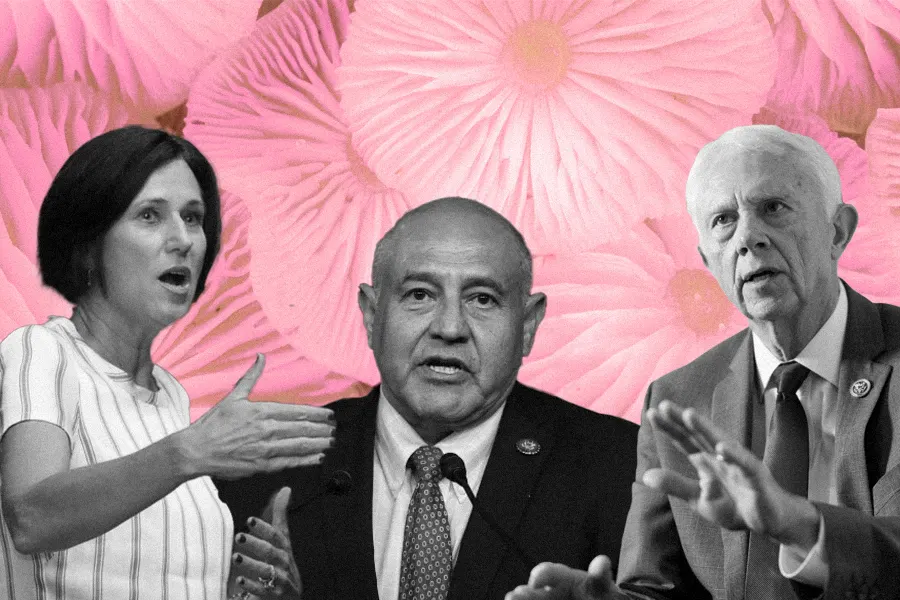A new congressional caucus is raising awareness among federal lawmakers about the therapeutic potential of psychedelics. The Congressional Psychedelics Advancing Therapies (PATH) Caucus aims to accelerate clinical research into the use of psychedelics—specifically psilocybin and MDMA—through educating members of Congress and encouraging them to allocate federal funding for that purpose.
In recent years, a growing body of research has shown that psychedelics, administered in a therapeutic context, can provide relief for a broad range of traditionally difficult-to-treat psychiatric conditions. That clinical research, however, has been almost entirely privately funded, significantly stunting the speed at which psychedelics might become legalized as therapeutic treatments.
Like other recent bipartisan efforts aimed at expanding access to psychedelic-assisted therapies—such as the Right to Try Clarification Act, introduced last summer by senators Cory Booker (D-NJ) and Rand Paul (R-KY)—the PATH Caucus hinges largely on veterans, many of whom in recent years have become increasingly vocal in their support for psychedelic research, which in turn has helped to push some states in the direction of decriminalization.
READ: Where Is Psychedelic Therapy Legal?
The caucus (a caucus is a private meeting attended by the supporters of a particular political candidate or cause) is being spearheaded by the Apollo Pact, a nonprofit organization devoted mainly to securing federal funds for psychedelic research. The organization was founded by Jon Kostas, a former participant in a 2015 landmark clinical trial at New York University led by doctors Stephen Ross and Michael Bogenschutz, which investigated the potential for psilocybin to treat alcoholism. Kostas struggled for years with a destructive relationship with alcohol, which had gradually eroded his relationships and mental health. He attended his first Alcoholics Anonymous meeting at the age of sixteen, but he never found the twelve-step program to be particularly effective. He isn’t alone: the success rate of AA currently stands between five and ten percent, according to one estimate.
But something clicked during his first guided psilocybin experience (he would have a total of three). As he lay on a therapist’s couch, wearing headphones and an eye mask, he saw himself standing in a vast desert, looking up at a huge bottle of wine which towered menacingly over him, like the obelisk at the beginning of 2001: A Space Odyssey. As he stared, the giant bottle started to melt away, disappearing beneath the sand. He would later describe that vision as “pretty obvious symbolism of my addiction leaving me at that moment.” Today, he says, he no longer feels any kind of craving towards alcohol.
In 2020, Kostas fled COVID-devastated Manhattan to spend some time with his girlfriend’s family in California. Her mom—former US congresswoman Mimi Walters—was impressed by his ability to remain abstinent, yet sociable and content, during the evenings while the rest of the household was drinking. The two talked at length about his history of alcohol dependence and his seemingly miraculous experiences at NYU. “Obviously, his treatment worked,” Walters says. “I’m a true believer.”
How to Grow Shrooms Bundle
Take Both of Our Courses and Save $90!
Kostas asked Walters if she would chair his nonprofit, and she accepted. The two quickly got to work planning the PATH Caucus, tapping into Walters’ extensive network in the federal government to further the core mission of the Apollo Pact. They soon found support in Congressmen Lou Correa (D-CA) and Jack Bergman (R-MI), who have agreed to co-chair the effort. The caucus formally kicked off with a press event in November, and it has met twice since then—once with Dr. Bogenschutz to explain the basics of psychedelic-assisted therapy to the attendees, and then again with six Navy SEALS who told their stories of finding healing through such therapy.
For years, mainstream psychiatry has struggled to ebb a rising tide of mental distress among veterans. According to the US Department of Veteran’s Affairs (VA), veteran suicides were more than 16 percent higher than non-veteran suicides in 2022. The shocking statistics, coupled with powerful testimonies from veterans both in the media and in halls of government, has convinced a number of conservative politicians—such as former US Secretary of Energy and former Texas governor Rick Perry—to reconsider their once staunchly oppositional stance towards psychedelics.
Walters considers herself to be among that group. “As a conservative Republican,” she says, “if somebody had told me five years ago that I would be helping [to] educate and promote treatment using psychedelics, I probably would’ve said, ‘What are you smoking?’”
In addition to her first meeting with Kostas—who would eventually become her son-in-law—Walters says she was motivated to start publicly advocating for mental health reform for an even more personal reason: Her son was diagnosed with bipolar disorder when he was a freshman in high school. Learning to help him cope with that diagnosis has given her, she says, “much more appreciation for the struggles of mental health disorders.”
Though she speaks fairly openly about her son’s condition, she’s been dismayed by a general discomfort among her former colleagues to discuss the (often painful) issue of mental health. “You’d be surprised [by] how many members of Congress have family members that are struggling or have struggled [with mental illness],” she says. Her fellow republicans, she believes, are particularly reticent on this subject.
READ: States Are Embracing Psychedelics, Paving the Way for FDA Approval
Part of her mission with the PATH Caucus is to destigmatize such discussion among federal lawmakers, thereby hopefully garnering more support for new research into psychedelic-assisted therapies. To that end, she’s been taking what she describes as “an emotional approach” in her meetings with members of Congress—relying less on impersonal data, and instead trying to create a sense of a common health problem that’s worthy of honesty, empathy, and—critically—a new paradigm for treatment.
Walters emphasizes that the PATH Caucus is not in any way promoting the legalization or decriminalization of psychedelics. “I’m only okay with it if it’s going to solve a problem,” she says. “I’m not okay with using psychedelics because you want to go trip and have a good time.”
Education is also a major focus. Kostas recalls entering his clinical trials at NYU fearing that he’d become “addicted” to psychedelics (there’s a strong body of evidence showing these compounds are in fact non-addictive) or lose his mind (psychotic breaks are not unheard of in the psychedelic literature, but modern clinical trials are organized in such a way that psychological risk is minimized, and individuals who are predisposed to serious mental conditions like schizophrenia and bipolar disorder are excluded during the screening process). One of the goals of the PATH Caucus, he says, is to ameliorate those kinds of fears—borne largely out of decades of misinformation propagated during the Drug War—within the federal government.
“That’s really what we’ve been working on: educating the lawmakers,” he says. “Chances are, [some psychedelic-assisted therapies] will be FDA-approved, and we don’t want them to play catch-up. We want them to be fully aware of what’s going on, what the research has to show and how this whole clinical trial and medical treatment process works.”
Walters says that she would eventually like to see psilocybin and MDMA moved from the most highly restricted category of the Controlled Substances Act, Schedule 1, to Schedule 2, which would make it “a lot easier to open up the funding from the government.” She points out that Fentanyl—the biggest killer in the opioid crisis— is currently categorized as Schedule 2: “I mean, how crazy is that?” The caucus is scheduled to meet for the third time this fall to discuss that very crisis, and how it might be remedied through psychedelic-assisted therapies.
For the time being, Walters says she and the other leaders of the caucus are taking a slow-and-steady approach: “We’re in this for the long haul,” she says. “And we figure that if we take these incremental steps and spend a lot of time on [Capitol] Hill talking about this treatment and educating the caucus members, we’re going to get there.”

DoubleBlind is a trusted resource for news, evidence-based education, and reporting on psychedelics. We work with leading medical professionals, scientific researchers, journalists, mycologists, indigenous stewards, and cultural pioneers. Read about our editorial policy and fact-checking process here.

DoubleBlind Magazine does not encourage or condone any illegal activities, including but not limited to the use of illegal substances. We do not provide mental health, clinical, or medical services. We are not a substitute for medical, psychological, or psychiatric diagnosis, treatment, or advice. If you are in a crisis or if you or any other person may be in danger or experiencing a mental health emergency, immediately call 911 or your local emergency resources. If you are considering suicide, please call 988 to connect with the National Suicide Prevention Lifeline.



